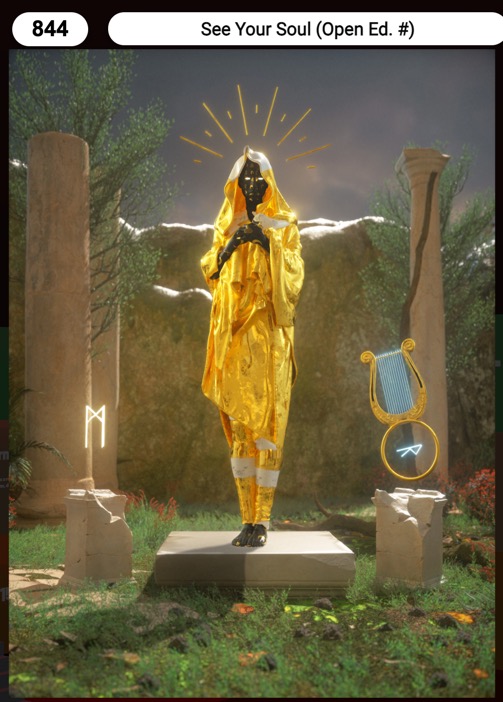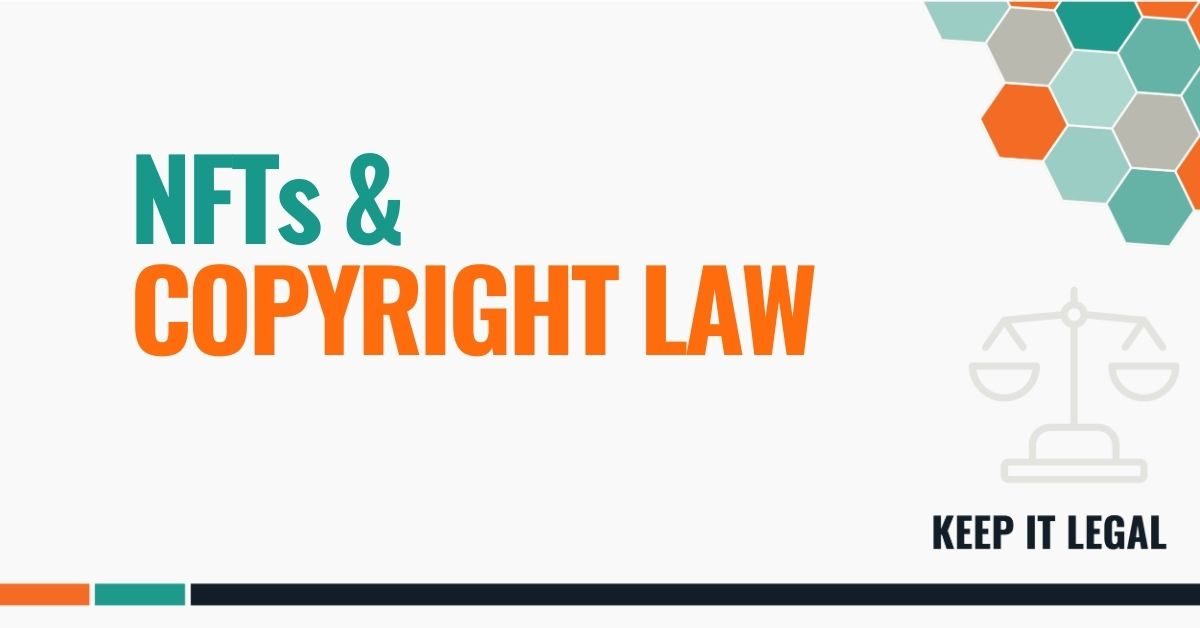What is an NFT, and how does copyright law come into play?
The term NFT stands for “non-fungible token”. A Bitcoin is a fungible token, just like dollars are fungible. One Bitcoin is the same as another, exactly as one U.S. dollar is equal to any other U.S. dollar. Unlike Bitcoins or dollars, each NFT is unique.
An NFT is a digital certificate of ownership. It’s simply a way of stating, and verifying, who is the owner of any digital asset, such as a piece of art. The reason anyone cares about NFTs is that they make it easy for someone to verify ownership, and therefore they make it easy to buy and sell digital art. You won’t buy something if the seller can’t prove that she owns it or if you can’t prove that you own it when you want to sell it.

This is a recently minted and sold NFT, part of the “Le Anime” series. Artist: toomuchlag (Stefan Mathez). Courtesy of owner Loren Rothman.
As of this writing, the market for digital art NFTs is exploding. See, e.g., today’s snarky New York Times headline: “JPG File Sells for $69 Million, as ‘NFT Mania’ Gathers Pace”.
The NBA is also using NFTs to create officially licensed digital collectibles under the “Top Shots” brand. So the analysis here applies outside of the realm of digital artworks.
So what does copyright have to do with NFTs?
Here, I’m going to discuss some basic principles of copyright law and how they apply (or should apply) to NFTs. Feel free to check out What Is a Copyright? for a slightly more in-depth intro to copyright law.
Under U.S. law, as soon as a work of art in any medium is created, the creator owns the copyright in that work. There are a few exceptions (such as work for hire), but we’re sticking to the basics here.
This principle—that copyright attaches at the moment of creation—applies regardless of the medium. It doesn’t matter if it’s an oil painting, a sound recording, or a piece of digital visual art.
When we talk about “copyright”, we’re really talking about multiple rights (sometimes called a “basket of rights”). These include the right to control who makes copies of the original work; who can sell, license, or otherwise transfer the copyright in work; and who can make derivative works from the original. Derivative works are new works based on a pre-existing work (a sequel, a remix, that sort of thing).
Typically, when someone buys a work of physical art, they are only purchasing the physical object. They are not purchasing the copyright in the work. The rights enumerated above remain with the artist.
So if you own an original oil painting, you can display it in your home or wherever you want, and you can sell or loan the painting to someone, but you can’t make copies of it, sell prints, or make new works based on the original.
Copyright can only be transferred based upon a written agreement. So if the artist agrees to sell you the copyright in the oil painting, then you do have those rights.
Note that this means that copyright is separate from, or abstracted away from, the actual “work” itself.
Wait, wasn’t this blog post supposed to be about NFTs?
The same rules that apply to physical works of art apply to digital art. The fact that the work has an ownership certificate in the form of an NFT doesn’t change the analysis.
In most cases, if you buy a digital art NFT, you will do so through a marketplace. These marketplaces serve the same function as art galleries, auction houses, and eBay do for works of physical art. They connect buyers and sellers. They also create the terms of sale. If it’s a first-time sale, those terms are (presumably) created in conjunction with the original artist.
So, if you buy an NFT, my presumption is that you are only buying ownership in the NFT itself. You are not buying the copyright, unless there is a written contract (such as language in the marketplace’s terms of sale) stating that the seller is assigning the copyright in the work to the buyer.
If you are creating (“minting”), buying, or selling an NFT, read the terms of sale of the marketplace that you’re using. You want to make sure that you know what you are actually buying. If you’re still not clear about the terms, and if there’s a significant financial investment or upside involved with the transaction, you should consider engaging an intellectual property attorney.
What rights do NFT owners have?
They have the right to own, sell, lend, or otherwise transfer the NFT itself. They don’t (unless they own the copyright) have the right to make or sell copies of the digital art, to transfer the copyright in the work, or to create derivative works based on the original.
The “right to make copies” bit is messy in the digital world. For example, if I buy an NFT, and then I post it to Instagram with the message “Check out this cool NFT that I just bought!”, that’s creating many more digital copies. But this is true for all kinds of visual art these days, and the artist is free to go to Instagram and file a copyright takedown notice, requesting that the post be removed. My ownership of the NFT wouldn’t make that request invalid unless I also owned the copyright.
I think that’s enough for this post. Of course, there are a lot of other intellectual property issues related to NFTs that are worth considering. What about when someone takes a piece of art that they don’t own and “mints” or sells it as an NFT? If the NFT is created in whole or part based on an algorithm (a computer program), who owns the copyright? What about trademark issues? How do smart contracts apply to NFTs and how can they be used to benefit artists when the NFTs are sold in the future? Maybe I’ll do a series of posts discussing these issues, if there’s enough interest.
In the meantime, if you’re an artist or an NFT collector/investor, make sure that you know your rights.
If you have questions about NFTs and intellectual property rights, ask away.


